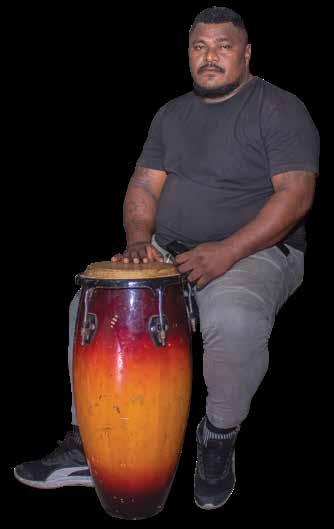
4 minute read
Des Yaninen
Conversation BREAKFAST WITH …
DES YANINEN SMALL BUSINESS ADVOCATE
BY CARMEL PILOTTI | PHOTOGRAPHS: GODFREEMAN KAPTIGAU
Desmond Yaninen is a young Papua New Guinean entrepreneur who is president of the Micro, Small and Medium Enterprises (MSME) Council. He passionately believes in the potential for PNG to grow its economy and raise the standard of living by creating wealth through small business.
What’s a usual breakfast for you? I just have a smoothie in the mornings, usually a blend of apple, beetroot, carrot and ginger. Then I have lunch around 1pm and that keeps me energised for the day. I’ve been on an intermittent fasting diet for the past three to four years. Contrary to popular belief, carbohydrates in the morning are not good for you, they pick you up and then you crash, so to keep my mental alertness, I just have this blend. Why did you choose the Copper Café at the Hilton for your smoothie this morning? I love the smoothies here. The ingredients are always really fresh so you feel you get that extra boost in the morning. How did you get involved in the SME sector? I was employed by the National Development Bank (NDB) and I developed a number of products for women and youth, including a ‘Women in Business’ product that has lent almost a hundred
million kina to women. Thousands of women have participated and many have become millionaires through that scheme. I’ve just remained committed to small business, even though I’ve left the NDB and I am now running my own firm, and also in my capacity as the head of the MSME Council. Why is promoting SMEs so important to you? I’ve been an evangelist for SMEs, and particularly women and youth in SMEs, for the past 10 years. The job market in PNG is limited. There are only ever about 500,000 jobs in the formal sector, and looking at our population, there are only enough jobs for 10% of our adult population at any one time. So you have around 90% of our population still looking for jobs, no matter how qualified you are. So we need to change the conversation and really get people to start looking at business. What projects are you working on now? Less than 20% of school leavers each year will have opportunities; 80% coming out (of school) will automatically be labelled as failures because they didn’t get any (job) offers. So you have a lot of smart kids that are missing out. This burden put on young people creates an atmosphere of negativity, which in turn breeds failure. We’re calling them failures for something that is not their fault – we don’t have enough space for all these young people, so we have to do something about it.

The definition of success is go to university, get a job, and work your way up the corporate ladder. So my Youth SME Program is about telling young people that they don’t need to go to uni and get a job to be successful. I want them to think about being employers and not employees. How did you get from working for someone else to working for yourself? I spent about 13 years working for the NDB and while I was there I saw an unmet need – every year the bank would receive millions of loan applications, but only a third could be funded. So I established my own financial services company, Pacifund (there are 11 employees now), to address the problem of access to finance. And in particular not debt funding, but equity funding. So getting SMEs to pitch their businesses in a way that will encourage investors to come in and invest. What is it that inspires you to do what you do? I would like to see PNG go from a third-world country to a first-world country. That’s what inspires me long term – it might take 100 years, but I’m doing my bit. What is one thing you tell people to encourage them to take up the SME journey? Failure is a crucial ingredient
Left: Des Yaninen, urging Papua New Guineans to create wealth through their own businesses. Opposite: A morning smoothie at the Hilton’s Copper Café.
to success – you can’t succeed without failing, so I encourage people to fail fast. Start something and let it crash and burn; but you have to learn from it and start over again. And over time you’re learning from your experiences and collecting information, and as you put it together you’re able to come up with something that will serve you a lot better in the long run. What are some of the common misconceptions that SME owners have? The most common misconception is that anyone can apply for a loan without putting up any security or equity. Once small business owners find out that they have to put something up, many are deterred and never proceed. If you could wave a magic wand to make business conditions better for SMEs in PNG, what would you do? The biggest challenge is the mindset of our entrepreneurs. If you think something is too difficult, then that’s what it becomes. The opposite is true. There is immense opportunity in our country, and those who have persisted and soldiered on regardless of the limitations and barriers have become immensely successful. If I had a magic wand to wave, I would grant everyone an iron will to succeed despite all odds.







